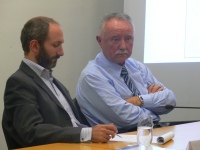{
"authors": [
"Anton Bebler",
"Sam Greene"
],
"type": "event",
"centerAffiliationAll": "",
"centers": [
"Carnegie Endowment for International Peace",
"Carnegie Russia Eurasia Center"
],
"collections": [],
"englishNewsletterAll": "",
"nonEnglishNewsletterAll": "",
"primaryCenter": "Carnegie Endowment for International Peace",
"programAffiliation": "",
"programs": [],
"projects": [],
"regions": [],
"topics": []
}
Is Kosovo a Problem? If So, Whose?
Fri, September 24th, 2010
Moscow
IMGXYZ2701IMGZYXTwo years after it declared independence from Serbia, Kosovo is struggling to develop autonomy and gain international recognition. But the new state is posing both security and political problems locally and for the international community.
The Carnegie Moscow Center invited Anton Bebler, professor of political science and defense sciences at the University of Ljubljana, Slovenia, and former Slovenian ambassador to the UN office in Geneva, to discuss Kosovo’s past, its efforts to create its own identity today, and what factors will influence its future. Carnegie’s Sam Greene moderated.
Defining Kosovo
Kosovo legally declared its intent to become an independent state in 2008, following a long process of decreasing autonomy under Yugoslav and then Serbian rule. This period culminated in 1989 and eventually led to civil war ten years later. After the civil war, Kosovo was occupied by NATO and a European protectorate was established.
A Serbian Problem
While Kosovo has presented a problem for many nations in the Balkans due to the state’s unique ethnic makeup, none has been more affected than Serbia.
- Psychology: Kosovo poses a problem for Serbian national identity. Its separation reflects internal Serbian political and cultural divisions, as well as a tension in their relations with other ethnic groups, most notably with the Albanian Kosovars. It also reflects a loss of power in the region – a hard realization after centuries of Serbia’s expansion.
- Security: A crackdown on non-violent student protests in 1981 spurred a backlash against Serbian military and police rule in the country. To maintain control, all republics of the former Yugoslavia sent military assistance. Kosovo was subjected to martial law, which prompted continuing conflict between the Albanians and Serbs in the region.
- Political: Serbia’s management of Kosovo eventually attracted international attention. The dismantling of Albanians schools, social services, and the expulsion of Albanians from local government prompted the international community to pressure Serbia to respect Albanians’ rights and to lessen its tight control of the area. Serbia’s unwillingness to cooperate is among the causes of the country’s political problems for the past two decades.
A Russian Problem
Russia has been indirectly affected by the issue of Kosovo for the past century. Russia’s interest in the area is associated with pan-Slavic and orthodox Christian sentiment, Bebler argued, as well as geopolitical considerations. Russia heavily supported the Serbian expansionism that led eventually to World War I. The consequences of that war were felt not only through direct casualties, but also through long-lasting effects that spurred two revolutions and the disintegration of the Russian Empire. According to Bebler, after paying dearly for its involvement, Russia is hesitant to support either Serbia again, or Kosovo, and has refused to be pulled into another Balkan conflict.
The Future of Independence
Much of Kosovo’s future hinges on Serbia’s actions.
- Practical Problems: While no one expects Serbia to recognize Kosovo diplomatically, Serbia should discuss practical ways to improve the lives of Serbian refugees from Kosovo, and Kosovars. Serbia must help to address practical problems such as water supply, electricity, roads, and border control in Kosovo.
- Ending the Boycott: Although Kosovo is still developing its own national identity, it is unlikely to be subject to Serbian rule in the future – a fact that Serbia must accept. By ending its boycott of Kosovo, Serbia can help ensure stability in the region. A stronger Kosovo will have a positive effect on the stability of the Balkans, including in Macedonia and Bosnia and Herzegovina.
Due to instability and its question of independence, Kosovo is still heavily regulated by international forces. However, after recognition by 70 nations and the establishment of security by NATO-led force, Kosovo will eventually be ready to become a fully autonomous state. Serbia’s recognition and assistance, Bebler concluded, will be the final factors in securing the region’s stability and ensuring the strength of Kosovo.
Carnegie does not take institutional positions on public policy issues; the views represented herein are those of the author(s) and do not necessarily reflect the views of Carnegie, its staff, or its trustees.
Event Speakers
Anton Bebler
Sam Greene was a deputy director for operations at the Moscow Center. He joined the Moscow Center in 2005. Previously, he was senior media program advisor for the New Eurasia Foundation, and a London and Moscow correspondent for FT Business.
